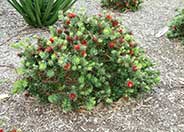
Common name:Bottlebrush Little John
Botanical name:Callistemon X viminalis 'Little John'
The 'Little John' exhibits very dense, compact growth to 4' x 5' slowly. It produces clusters of blood red flowers and blue green foliage. A very regular, almost symmetrical, spiral patten of dense oval leaves is shown along the stems.
Maintenance Tips
Callistemon x viminalis ‘Little John’ is a dwarf variety of the bottle brush tree. It has a dense round form with blue-green foliage, narrow point leaves, and red bottlebrush flowers that will bloom for the majority of the year. It slowly grows to about 4-5’ tall and wide and is resistant to many pests and diseases. Hard and frequent pruning is not necessary due to its size and growth rate, but thinning out dead or long branches can be useful to help shape or reduce size. They can even tolerate some hedging to shape as well. Spent blooms will fade to a dark red and can be removed once they have accumulated to give the plant a cleaner look.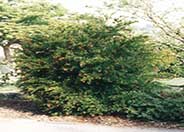
Common name:Dwarf Pomegranate
Botanical name:Punica granatum 'Nana'
A dense growing shrub to 3' tall, the Dwarf Pomegranate produces single, orange red flowers that are followed by 2" diameter fruit. Its apple green leaves are about 1" long and 1/2" wide.
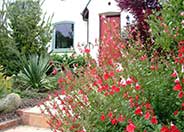
Common name:Red Star Autumn Sage
Botanical name:Salvia greggii 'Red Star'
This shrub will grow 1'-4' tall and 1'-4' wide. It has glossy green leaves with red flowers that bloom from fall to spring.
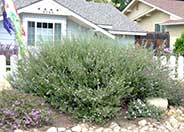
Common name:Australian Rosemary, Coast Rosemary
Botanical name:Westringia fruticosa
The Australian Rosemary is an evergreen shrub that grows 4'-6' tall. It has soft, gray green leaves and white flowers throughout the year and prefers sun and little to average amounts of water. This shrub is also drought tolerant.
Maintenance Tips
Westringia fruticosa is a fine-textured, evergreen shrub that grows 4-6' tall and 6-10' wide. Its common name is Coast Rosemary because the foliage resembles Rosemary. This plant will look and perform its best if it is given the space to reach its full mature size. The flowers bloom along the branches throughout the year in warmer climates so there is no need for deadheading. This shrub has a free-form growth habit so the thinning method is usually the best way to prune. Making pruning cuts towards the center will allow sunlight into the interior and will allow the plant to keep its free-form shape. If this shrub is being used as a formal hedge, it can be sheered to manage its shape and size without losing the blooming potential. It is a very tough plant, rarely suffering from pests or disease, and it can tolerate wind and sea spray.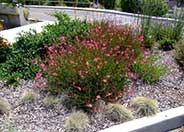
Common name:Pink Gaura
Botanical name:Gaura lindheimeri 'Siskiyou Pink'
Pink Gaura is a profusely flowering perenial that grows to 4' tall. It has pink buds that open to showy pink and white flowers in spring and summer. Accepts full sun or partial shade.
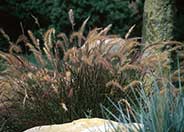
Common name:Eaton Canyon Dwarf Fountain Grass
Botanical name:Pennisetum 'Eaton Canyon'
This grass will grow 2'-3' tall and has red or bronze colored stems that are very slender and topped with red purple whips.
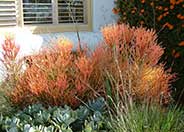
Common name:Sticks on Fire Pencil Tree
Botanical name:Euphorbia tirucalli 'Sticks on Fire'
In frost free areas, Euphorbia can become a 30' tree but in colder areas, it is often knocked back by frost. It can be single or multiple trunked. It has green cylindrical branches that are about the diameter of a pencil. Leaves are not usually present. Some people are allergic to the sap. It is tolerant of salt, full sun, part shade and quite drought resistant. It is a great accent plant for a container. This form has yellow or orange branches if in full sun.
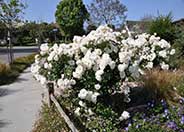
Common name:Iceberg Floribunda Rose
Botanical name:Rosa 'Iceberg'
This is a shrub rose (there are climbing varieties) with an abundance of fragrant, medium sized, white blooms. It is one of the most popular roses and very tough.
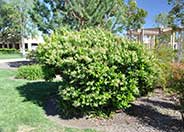
Common name:Wax Leaf Privet
Botanical name:Ligustrum japonicum 'Texanum'
This dense evergreen shrub of an upright habit is capable of growing as a shrub or small tree. Its dark green, leathery leaves are opposite those of a simple evergreen plant.
Photographer: GardenSoft
Practice grass-cycling by leaving short grass clippings on lawns after mowing, so that nutrients and organic matter are returned to the soil.
Mulching and adding compost to soil can minimize evaporation and help soil absorb and store water.
Drip and other smart irrigation delivers water directly to roots, allowing no excess water for weeds.